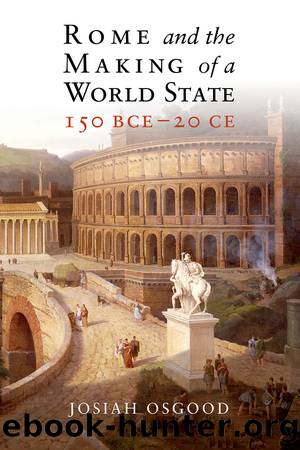Rome and the Making of a World State, 150 Bce20 Ce (9781108349598) by Osgood Josiah

Author:Osgood, Josiah
Language: eng
Format: epub
Publisher: Cambridge Univ Pr
Published: 2018-03-23T00:00:00+00:00
Campaigning at the Ends of the Earth
The dispatches Caesar sent back to Rome at the end of 55 had their own thrills. The incursion of two German tribes into Gaul allowed him to cross (in retribution) the Rhine, where (he wrote) the men were as tall as giants and wore practically nothing despite the cold. Caesar spanned the river with a spectacular bridge â crossing by boat was âbeneath his and the Romansâ dignity.â But later in the year he had no choice when he sailed to Britain, claiming that tribes there had been helping the rebels in western Gaul. Economic gain may have been Caesarâs real motive, not to mention the glory of campaigning at the ends of the earth, where men still fought on chariots, dyed their bodies blue, and sported mustaches.
While Caesar spent a second year campaigning in Britain in 54, Gaul grew restless, especially in the north. Over the winter of 54/53, a legion and a half was massacred. Roman reprisals spawned further insurgencies, in a spiral of violence. Caesar increased the number of his legions to 10 (one was a loan from Pompey). The Gauls themselves formed a better-organized army under the leadership of a young noble of the Arverni, Vercingetorix. Losses by Caesar to this clever general led practically all the tribes to join the uprising, even the Aedui. Caesar nearly lost his grip on Gaul completely, until Vercingetorix made the mistake of occupying the hilltop settlement of Alesia. Caesar surrounded it with two rings of siege works, to prevent both escapes and reinforcements. The Gallic rescue operation failed, and with the capture of Vercingetorix, Gaulâs fate was sealed.
With this war his from the start, narrated in his own brilliant commentaries (rather than those of paid writers), Caesar had outdone Pompey. He had added a vast tribute-paying territory to the Roman Empire. Caesar himself had grown wildly rich, and his officers and soldiers â along with friends and allies back in Italy and Rome â benefitted too. By the start of 50, Caesar had been away from Rome for seven years and in many respects had created his own state in Gaul. As general, he was its clear leader, and under him was a hierarchy of officers and soldiers. A mint issued coins; a secretarial staff handled logistics and diplomatic relations.
The contrast with Crassus and his Parthian war in the east could not have been sharper. Originating in the Asian steppe, the Parthians expanded westward in the second century BCE, encroaching on the Seleucid Empire all the way to the Euphrates River. While the Parthian rulers embraced some of the flamboyance of Hellenistic kings, they never abandoned their tradition of fighting on horseback. King and nobles would fight like medieval knights, with heavy armor and lances, while mounted archers would gallop alongside them and turn backward to fire the famous âParthian shot.â Relations between Rome and Parthia had been strained since Pompeyâs less-than-faithful dealings with the king during the Mithridatic Wars, but Crassus was entirely to blame for precipitating full war.
Download
This site does not store any files on its server. We only index and link to content provided by other sites. Please contact the content providers to delete copyright contents if any and email us, we'll remove relevant links or contents immediately.
| Africa | Americas |
| Arctic & Antarctica | Asia |
| Australia & Oceania | Europe |
| Middle East | Russia |
| United States | World |
| Ancient Civilizations | Military |
| Historical Study & Educational Resources |
Magic and Divination in Early Islam by Emilie Savage-Smith;(1533)
Papillon by Henry Charrière(1430)
Bohemians, Bootleggers, Flappers, and Swells: The Best of Early Vanity Fair by Bohemians Bootleggers Flappers & Swells- The Best of Early Vanity Fair (epub)(1402)
Ambition and Desire: The Dangerous Life of Josephine Bonaparte by Kate Williams(1387)
Twelve Caesars by Mary Beard(1314)
Operation Vengeance: The Astonishing Aerial Ambush That Changed World War II by Dan Hampton(1162)
What Really Happened: The Death of Hitler by Robert J. Hutchinson(1161)
London in the Twentieth Century by Jerry White(1145)
The Japanese by Christopher Harding(1131)
Time of the Magicians by Wolfram Eilenberger(1125)
Twilight of the Gods by Ian W. Toll(1117)
Lenin: A Biography by Robert Service(1074)
The Devil You Know by Charles M. Blow(1024)
A Social History of the Media by Peter Burke & Peter Burke(976)
Freemasons for Dummies by Hodapp Christopher;(964)
Napolean Hill Collection by Napoleon Hill(942)
Henry III by David Carpenter;(919)
The Rise and Triumph of the Modern Self by Unknown(913)
Richard III (The English Monarchs Series) by Charles Ross(908)
